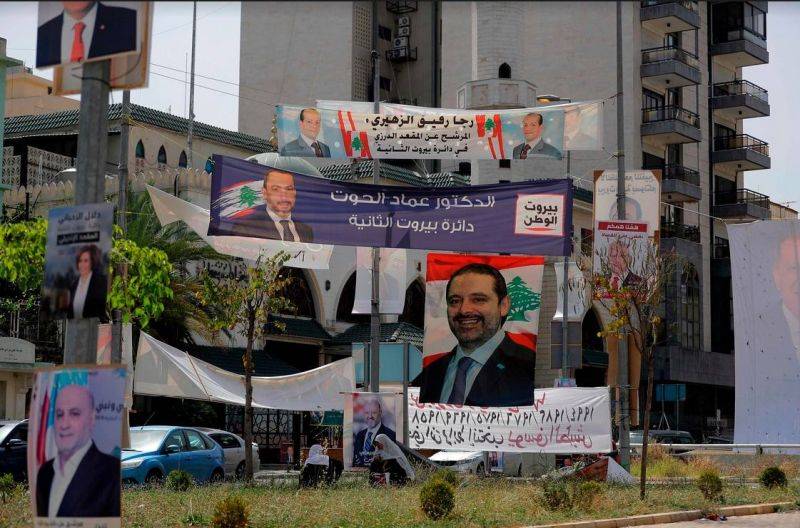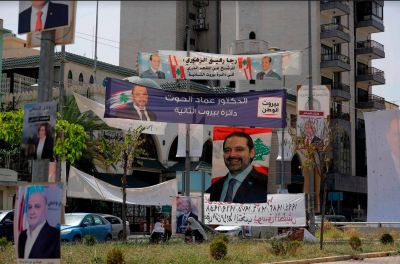
Election posters in anticipation of the 2018 legislative election in a district of Beirut. (Credit: Joseph Eid/AFP)
As he made the headline-catching Jan. 24 announcement that he is suspending his political career, Saad Hariri, almost in tears, was keen to thank the capital. “I will not forget what Beirut did for me,” he said. That is because a member of the Hariri family has held a Sunni seat in Beirut II District since 1996.
Tammam Salam, another traditional MP in the same electoral district, and part of an important family with historic political influence in Beirut, will not run in May’s legislative elections either.
These absences would leave a substantial vacuum on Beirut’s Sunni arena. In 2018, the Future Movement’s list in Beirut II [which also included Walid Jumblatt’s Progressive Socialist Party] gained a dominant position, with some 63,000 votes, or 44 percent of the vote.
This outcome allowed the Beirut Future List to win six of the 11 seats in the district: four Sunnis, one Druze and one Greek-Orthodox. However, a third of the list’s votes is owed to Saad Hariri, who won 21,000 preferential votes. Salam, for his part, won over 9,000 votes.
Only two other lists of the nine competing in the district met the electoral threshold percentage in 2018. Beirut Unity List, which is supported by the March 8 Coalition [Hezbollah, Amal Movement, Free Patriotic Movement and the pro-Syrian Association of Islamic Charitable Projects, aka al-Ahbash], won 33 percent of the votes (four seats). Fouad Makhzoumi’s Lebanon Is Worth It List won 11 percent of the votes (one seat).
The withdrawal of Hariri and his organization a few months ahead of the legislative elections has shaken up the political landscape in the capital’s west side. Many political players hope to have most of Hariri’s voters on their side, in addition to the 217,000 voters (i.e. around 60 percent of those eligible) who abstained from voting in 2018 in Beirut II.
“It's hard to predict anything right now,” said Rabih Habr, founder and director of Statistics Lebanon Ltd, “because neither the lists nor the alliances are finalized.”
Hezbollah and its allies
Although the political landscape is still unsettled for now, some have already stood out from the crowd in announcing that they will join the electoral battle in Beirut II District.
First there are Hezbollah and its allies. Their list benefited in 2018 from ample support from the Shiite community in Beirut [ 20 percent of the voters] and won 85 percent of the votes in the community's polling stations, according to a study by the Lebanese Center for Policy Studies (LCPS).
An abstention by pro-Hariri voters could be to the advantage of the Ahbash, who won only 12 percent of Sunni votes in 2018.
“Hezbollah is campaigning to stimulate voters’ turnout in the elections,” Faysal Abdel Sater, an analyst close to Hezbollah, said.
Pro-Syrian Sunni chief Shaker Berjaoui also returned to the scene. He was arrested in 2014 following armed clashes between his supporters and those of the Future movement in Tariq al-Jadideh. When freed in 2018, the Future Movement’s leaders pointed to Hezbollah’s interference in the judiciary.
Sunni businessman Fouad Makhzoumi also intends to establish himself as a key figure in Beirut II District. According to the LCPS,10 percent of the Sunnis supported Makhzoumi in the 2018 elections.
“We will form a list, as in 2018,” a source close to the Beirut MP said. In the past few months, the latter beefed up his criticism of Hezbollah and its “illegal” arms that “protect and encourage corruption.”
In an electoral district that includes two Christian seats, could the Lebanese Forces, who are also critical of Hezbollah, join the Makhzoumi list? While Samir Geagea’s party already told L'Orient-Le Jour that talks are underway with the Sunni magnate, the latter affirmed extending a hand to all those who share his vision for a “modern and independent” Lebanon.
Recently, Makhzoumi started a project involving the installation of solar street lights in several neighborhoods of the capital that have been plunged into darkness by ongoing power outages.
The electoral threshold equation
Al-Jamaa al-Islamiya is another movement that could benefit from Hariri's absence. Its list, which also included independent figures, obtained 5.2 percent of the votes in 2018, insufficient for its candidates to take seats in Parliament.
“Al-Jamaa is a well-organized movement, with long electoral experience,” said activist and elections expert Assem Chaaya. “If they manage to build on that, they could make a breakthrough.”
Sunni businessman Nabil Badr, an unsuccessful candidate on this list in 2018, seems to have earned the support of Dar al-Fatwa (Lebanon's top Sunni religious authority), since he was appointed head of the Treasurers of Zakat Council (Muslim almsgiving) in Lebanon.
The protest movement is also running in the elections, as several groups already announced that they will have candidates in all electoral districts. Psychologist and activist Mia Atoui and academic Lina Tannir are candidates for Minteshreen and Taqaddom respectively, running in Beirut II District.
They must establish their preeminence, however. The civil society list Kulluna Beirut obtained only 4.3 percent of the vote in 2018, which is well behind the 9 percent electoral threshold. The reformist camp will find it hard to meet this threshold, especially if they run on several lists.
“The opposition groups must rally behind a single list and a project that would convince those who abstained in the 2018 polls,” Chaaya said. “The latter, who are encouraged to vote, would probably vote for them. But they mainly need to organize their ranks and have access to electoral data so as to better mobilize voters.”
New figures, including Bahaa Hariri, Saad’s older brother, could join the contest for Beirut II. Bahaa claims to be both his father’s political heir and the voice of the October 17, 2019 protest movement.
The Sunni businessman, who finances the Sawa Li Lubnan movement (Together for Lebanon), announced Friday [Jan. 28] his intention to continue the journey of their father Rafik Hariri. He said in a recorded message that he would “join the battle to take back” Lebanon and will return to the country very soon.
Yet the traditional Sunni leadership may not be totally absent from Beirut’s electoral landscape. Former Prime Minister Fouad Siniora, who is seen as someone able to rally former Future Movement loyalists, could be working behind the scenes to prevent the Sunni political scene from being stripped out of its customary leadership.
A source close to the file confirmed Siniora’s activities to L'Orient-Le Jour. However, the source did not specify whether Siniora will present himself as a candidate, whether he intends to run in his stronghold in Sidon, or in Beirut in a bid to fill the vacuum Saad Hariri left behind.
This article was originally published in French in L'Orient-Le Jour
